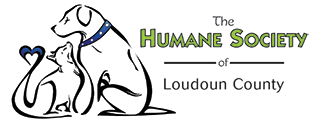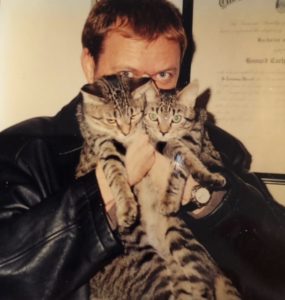
At the end of 2017, we received a kind note and donation from Mr. Howard Luck in honor of his cats Daisy and Violet:
“In March 1997, I was fortunate to adopt 2 kittens (age 4 months) from your society — Daisy and Violet. Violet passed away at age 14 years; Miss Daisy is still with me, at age 20+ years! Having Daisy and Violet in my life has been one of my best experiences. I’m so blessed to have connected with these wonderful beings. THANK YOU from the bottom of my heart for rescuing these kittens, and giving us the opportunity to be in each others’ lives. My gratitude is endless.“
We contacted Howard to learn more about his reasons for adoption, his experiences with Daisy and Violet, and his advice for those considering providing an animal with their “forever home.”
Why did you decide to adopt your two cats?
I had recently separated from my partner of five years; we’d had two cats together, and I made the very hard choice to leave them behind with my former partner so the cats wouldn’t be separated from each other and from the home they knew. After living in my new home in Springfield, Virginia for several months, I’d started seriously considering adopting a cat. The home just didn’t feel complete without feline companionship.
A good friend took me on a day trip to Loudoun County, and wanted to show me Old Town Leesburg. We happened upon a delightful boutique that specialized in cat-themed gift items. In the far back of the shop was a room where large, interconnected cages had been set up. And inside were two adorable tabby kittens, obviously a bit frightened of their surroundings. My friend and I immediately were drawn to these two! She encouraged me to adopt them right then and there; however, I was hesitant to make such a life-changing decision on the spot. This was not part of the day’s plan! Then the shop owner informed us that one of the Humane Society of Loudoun County volunteers had rescued them — someone had left them to drown in a stream or creek! I hesitated no more; I filled out the adoption papers immediately. And I’ve never had a single regret.
Was there a reason you decided to adopt from the Humane Society of Loudoun County?
As mentioned, it was completely by accident! However, I remember that the volunteers who assisted with the adoption were all dedicated, compassionate, and helpful. Also, there were checks in place to help ensure the kitties would be going to a good home where they would be well cared for.
Tell me a little about Daisy and Violet.
First, some background about their names: When we initially saw the kitties in the shop, we couldn’t tell them apart. They looked like twins. During the next week while I was waiting for the final adoption approval, I churned over what to name them. I wanted two names that would reflect the kitties’ seemingly twin characteristics. I recalled that a new Broadway show had opened, “Sideshow”, about conjoined twin sisters in the 1930s. I researched the twins’ names: Daisy and Violet Hilton. So, the kittens were christened Daisy and Violet.
Once Daisy and Violet moved into their new home, it became obvious that — despite their near-identical appearance — they had very distinct personalities. Daisy was the talker, and the more adventurous of the two. Violet was always more wary of strangers, or of new experiences. Also, Violet was initially ill with conjunctivitis and an upper respiratory infection. Daisy was very protective of her sister, and always stayed close to her. Over the years, this bond never diminished.
Both kitties were always affectionate (definitely lap-cats!), curious, extraordinarily well-behaved, and playful. Also, both seemed to have a sixth sense in regard to my mood: when I’d be sad or upset, each would come find me and offer extra affection and consoling. To this day, Daisy continues to be the best therapist!
What’s the best part about having cats in your life?
The companionship. The unconditional love. The opportunity to care for such beautiful and soulful creatures. The joy of knowing that I was able to save the lives of two amazing kitties, who have given me many years of happiness.
If Daisy could speak human, what would you want to know from her?
I believe that I was led to Daisy and Violet not only so I could save them, but so they could save me. Deep down I’ve always felt that these two kitties are my guardian angels, in my life to comfort and watch over me. If Daisy had the power of human speech, I’d ask her if that is indeed true. (However, as one of my guardian angels she’d probably have to be very coy with her answer!)
Do you have any advice for someone who is thinking about adopting a cat or dog?
I sense that rescue animals have a deep appreciation for the humans who save them. If you are able to give one (or more!) of these creatures a safe and nurturing home, committed to their care, and willing to always treat them with kindness, love, and dignity, the rewards will be immeasurable.
Thank you, Howard, for taking the time to chat with us!

Towne Animal Clinic, located at 64 A Plaza Street NE in Leesburg, has partnered with the Humane Society of Loudoun County since 2008. The clinic’s support has made an invaluable contribution to the ability of the Humane Society, a non-profit organization run completely by volunteers, to rescue and find homes for so many dogs and cats through the years. A quick tour of the clinic’s website demonstrates that community service is at the heart of the mission for the practice, and the Humane Society of Loudoun County is grateful to benefit from their generosity and commitment to the quality of life of our animal friends.
For anyone looking for a caring, compassionate practice to treat their animal family members, the Towne Animal Clinic is accepting new patients.
The dedicated veterinarians of the Towne Animal Clinic have been providing care to the dogs, cats, guinea pigs, hamsters, gerbils, rabbits, mice, and rats of Loudoun County since 1985 (sorry, no chinchillas, reptiles, or spiders—but they will provide referrals). The practice’s Doctors—Len Rice, Jason Bollenbeck, Melissa Derbin, Tyler Barrett, and Elizabeth Byers—and their staff of twenty make it a priority to listen patiently and respectfully to client concerns about their companions and to approach health care as a team.
The clinic has partnered with the Humane Society of Loudoun County (HSLC) since 2008, providing invaluable support in a variety of ways. In addition to maintaining a donation box for our Pet Pantry Program in their lobby, they have also at times allowed us to display some of our kittens available for adoption. 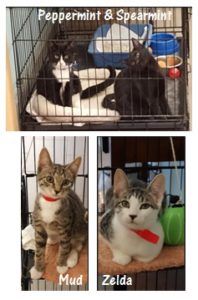
The clinic is one of eleven vets in the county that accepts HSLC’s discount certificates for the low-cost Spay/Neuter Program. A large percentage of our foster animals receive medical care from the doctors at Towne Animal Clinic, enabling us to provide essential health care to animals for whom we are seeking homes.
The clinic is also a key support in HSLC’s Trap/Neuter/Return Program with feral cats, which are the main sources of homeless kittens in the county. Spaying and neutering the cats, in addition to vaccinating and providing other care, supports the Trap/Neuter/Return Program in protecting other wildlife and decreasing disease in the colonies that pop up in various places. This work would not be possible without the support of community partners.
A VET WHO MAKES A DIFFERENCE
Dr. Melssa Derbin has been a veterinarian at Towne Animal Clinic since 2011. Originally from Indiana, she moved to Virginia to join the practice after graduating from Purdue University School of Veterinary Medicine. Why Virginia? Dr. Derbin had met her husband, Randy, also a veterinarian, in a Business Management class at Purdue, and he told her there were jobs to be had in the Northern Virginia Area. Why Towne Animal Clinic? “They do a lot of things in addition to general practice including surgeries and advanced dental care,” she explains. “Also, I love the family atmosphere, knowing my client’s names and walking through life with them. Keeping my patients happy and healthy through the life cycle is very rewarding.”
On a typical day in the practice, Dr. Derbin starts by checking in on any animals who had to stay overnight in the clinic, then she’ll see about twenty patients throughout the day. Wednesdays are for surgery, and the clinic is open half day on Saturdays. Although she sees mostly dogs and cats, one of her favorite areas of practice is treating small animals such as hamsters and mice that her clients bring in for care. “People are very attached to their small mammals,” she said, indicating with the palm of her hand the size of some of her patients.
Dr. Derbin is planning on training her dog, Pete, to become a therapy dog. The story of this 103-pound King Shephard illustrates the clinic’s dedication to helping animals in need. Found in a box with an injured paw about two years ago, weighing just three pounds, the vets and staff worked tirelessly to keep him alive, taking turns bottle feeding him and taking him home. At one point, as the puppy battled a respiratory infection, Dr. Derbin told her husband, “If I don’t take him home tonight, he won’t make it.” The rest is history—he recovered, and found a home where he is cherished and loved as he deserves. One day Pete will be serving either veterans or kids, whichever he prefers, who may be dealing with injuries like his.
How can people who care about homeless animals contribute to the cause? “Volunteering your time is the number one thing you can do to help,” Dr. Derbin believes wholeheartedly. There are many ways to help, and for people who are too pressed for time but can make donations to shelters and organizations, she emphasizes that giving locally can have a significant impact. “Donating to big national organizations doesn’t trickle down to local organizations like people sometimes think. Give to your local organizations, and you will be much more likely to see that money help the animals in your community.”
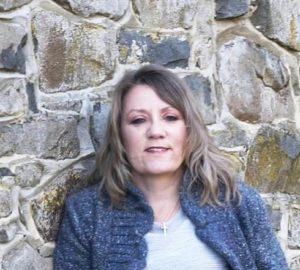
Working full-time doesn’t stop Lisa DeJohn from volunteering her time and talents to the Humane Society of Loudoun County (HSLC). From spreading the HSLC mission at various events to helping out with fundraisers, Lisa is making a real difference for homeless animals in the community. Find out how she got started and what advice she has for anyone who has thought about volunteering for HSLC.
How long have you been a volunteer with the Humane Society of Loudoun County (HSLC) and how did you first get involved?
I’ve been with HSLC for 5 years now. I got involved not long after losing my best side kick, Black Jack, my Standard Poodle. I was devastated, of course, and not quite ready to find a new fur friend. I saw an ad for an open house that HSLC was having at the Leesburg Library. So, I decided that I would go and see what it was all about. As soon as I walked in the room, a very friendly volunteer and former board member greeted me and told me all about HSLC and what they stood for. I was taken in and very impressed. Not long after talking to this former board member, we both realized that she had once dog sat for me. I knew at that moment it was a sign for me to start volunteering, and since I wasn’t ready for a new fur friend just yet, I could at least help save and find homes for others. It’s been a heaven sent ever since. This organization is amazing, and so dedicated at everything they do. I couldn’t be more proud to be a part of them.
What activity do you support at the Human Society of Loudoun County? 
I support many activities at HSLC. I help at fundraisers. I help out at many events like the Leesburg Flower and Garden Show to spread our mission to others. I sometimes help with graphic arts, like fliers or anything else they may need. I help at adoption events when I can and I’m also on the event committee that organizes the fundraisers and many other events that come up.
What are the rewards of being an HSLC volunteer?
The reward, of course, is helping the animals and knowing that we can help save and find homes for them. That makes my heart very happy; they need our voice and love when there’s no one else. Plus, it’s fun and you can meet some wonderful people and make new friends.
What are the challenges?
The challenges are that we need more volunteers and fosters. There are many that go above and beyond because there just isn’t enough help at times. For me, I wish I could give more of my time, but working a full-time job and the distance that I have to travel to and from work keeps me from being able to do more.
Please share your favorite memory as an HSLC volunteer:
My favorite memory as a volunteer is seeing an animal find a new home and knowing that it’s the perfect fit for the animal and family. Having the family share pictures showing how happy they all are is the best feeling.
Is there any advice you could share with someone who is considering becoming a volunteer with HSLC?
I would recommend that they come to one of the volunteer orientations and find what you’re interested in and what would be fun for you. There are so many ways to help! Ask many questions if you’re unsure how to help and find a mentor to shadow if you’re not sure where to begin. We are here to help make it awarding and fun at the same time.
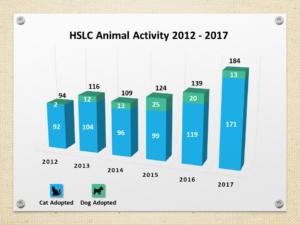
HSLC continues to grow, helping more animals and pet owners because of our generous donors and marvelous volunteers. Three of our major programs reached new records in 2017: Adoptions, Low Cost Spay/Neuter, and the Loudoun Pet Pantry.
The number of animals helped by HSLC has continued to grow over the years with the help of our many volunteers. In 2017 we were able to find homes for a record number of 184 animals! This amounts to countless trips to our partner veterinarians to provide vaccinations, wellness care, spay/neuter, and microchips. Our foster families provided many hours of socializing, training, and lots of love. Dozens of adoption events helped to showcase the animals. And our administrative volunteers handled mounds of paperwork including medical records, foster tracking, and adoption applications/agreements. Click Here to see our animals currently available for adoption.
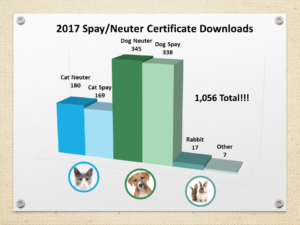 Our Low Cost Spay/Neuter Program provides discounts for Loudoun County residents through our Loudoun County veterinary partners. A record 1,056 discount certificates were downloaded in 2017! Any Loudoun County pet family can download a certificate from our website to receive a discount for the anesthesia and surgery portion of the spay/neuter process. There will be other costs involved because each participating veterinary practice has their own pre and post surgery requirements. Users of this program are encouraged to “shop around” to determine which participating veterinary practice best meets their needs. We have 11 Loudoun participating veterinary practices scattered around the county: Sterling, Ashburn, Leesburg, Purcellville, Lovettsville, and South Riding.
Our Low Cost Spay/Neuter Program provides discounts for Loudoun County residents through our Loudoun County veterinary partners. A record 1,056 discount certificates were downloaded in 2017! Any Loudoun County pet family can download a certificate from our website to receive a discount for the anesthesia and surgery portion of the spay/neuter process. There will be other costs involved because each participating veterinary practice has their own pre and post surgery requirements. Users of this program are encouraged to “shop around” to determine which participating veterinary practice best meets their needs. We have 11 Loudoun participating veterinary practices scattered around the county: Sterling, Ashburn, Leesburg, Purcellville, Lovettsville, and South Riding.
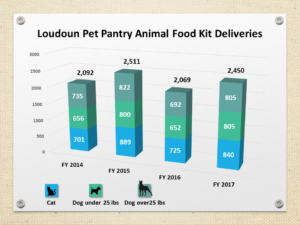 The Loudoun Pet Pantry has become a valuable resource for the Leesburg food pantry, Loudoun Hunger Relief, allowing them to include the family pets while feeding needy Loudoun families. This program helps keep pets in their loving homes when families fall on hard times instead of being forced to surrender them to a rescue simply because they cannot afford to feed them. The Loudoun Pet Pantry is a partnership between the Humane Society of Loudoun County, Loudoun County Animal Services, and Loudoun Hunger Relief. Donated dog and cat food is delivered to Loudoun Hunger Relief weekly.
The Loudoun Pet Pantry has become a valuable resource for the Leesburg food pantry, Loudoun Hunger Relief, allowing them to include the family pets while feeding needy Loudoun families. This program helps keep pets in their loving homes when families fall on hard times instead of being forced to surrender them to a rescue simply because they cannot afford to feed them. The Loudoun Pet Pantry is a partnership between the Humane Society of Loudoun County, Loudoun County Animal Services, and Loudoun Hunger Relief. Donated dog and cat food is delivered to Loudoun Hunger Relief weekly.
Pet food donation bins are located around the county. We need small bags of dog and cat food (3 to 8 lbs) and cans of any size. Monetary donations help purchase food for the program when needed. Donate Online Here – be sure to dedicate your donation to the Pet Pantry.
At least 40% of families visiting Loudoun Hunger Relief for food assistance also request pet food. Currently we are only able to provide enough food for about half of these requests but we are working on ways to improve. Space is a major problem with all three organizations.

The Washington Area Parrot Head Club, Parrotheads of the Old Dominion, and Pirates of the Potomac clubs are banding together to help Loudoun County pet families in need. Come party on March 24, 2018 at the Bungalow in Chantilly 7 – 10 pm; live music; Raffles and Silent Auctions; food and drink specials.
All proceeds and pet food go to the Loudoun Pet Pantry, a partnership between the Humane Society of Loudoun County, Loudoun County Animal Services, and Loudoun Hunger Relief to help keep pets in their homes by providing dog and cat food supplies to Loudoun County pet families in need.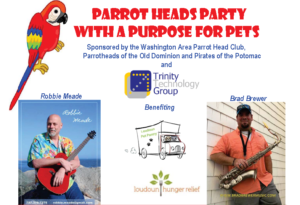
So put on your best Hawaiian shirt
Change your latitude & attitude
And join the party for pets
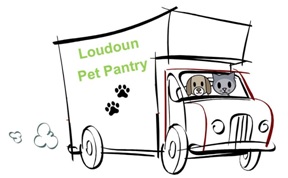
Parrot Head simply refers to someone who is a fan of Jimmy Buffett’s music and the lifestyle that he promotes; a fan of Tropical Rock which incorporates 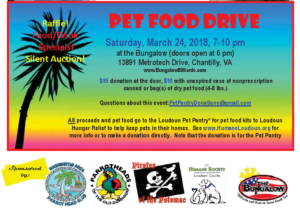 elements and influences of rock and roll, reggae, country music, Caribbean, Calypso music and zydeco, with themes and musical compositions inspired by an island style. The typical parrothead is pictured to wear a Hawaiian shirt, flip-flops, and other tropical attire, and to enjoy drinking margaritas on the beach.
elements and influences of rock and roll, reggae, country music, Caribbean, Calypso music and zydeco, with themes and musical compositions inspired by an island style. The typical parrothead is pictured to wear a Hawaiian shirt, flip-flops, and other tropical attire, and to enjoy drinking margaritas on the beach.
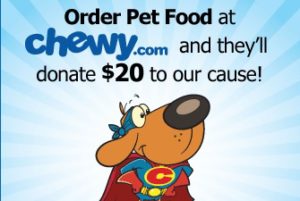
HSLC is now partnering with Chewy.com through their Rescue Referral Program. We will receive a $20 donation from Chewy for every first-time customer who orders through our custom landing page.
Chewy is the retailer of pet food and other pet-related products owned by PetSmart. The company offers around 30,000 items for dogs and cats.
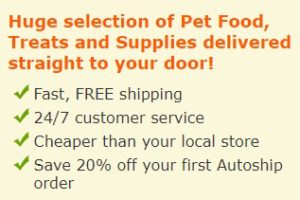
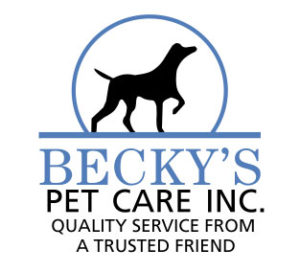
The Humane Society of Loudoun County is partnering with Becky’s Pet Care, Inc., a leading professional pet sitting company serving the Northern Virginia areas. 2018 marks Becky’s Pet Care’s 20 years in business. In honor of adopting a pet through the Humane Society of Loudoun County, Becky’s Pet Care is offering a $20 off promotional discount for any pet sitting service they offer. Adopters will receive a coupon in their Adoption Packets. Becky’s Pet Care current serves the following areas in Loudoun County: Sterling, South Riding, Stone Ridge, Ashburn, and Oak Grove. We will be expanding soon in more Loudoun area cities and divisions.
Becky’s Pet Care – Company History:
“Responding to Northern Virginia’s growing need for professional pet care services, Becky O’Neil founded Becky’s Pet Care, Inc. in her townhouse basement in 1998. Becky was a one-woman show, running the operation as sole proprietor and sole employee. Thanks to her strict professional standards and knack for hiring devoted animal lovers, Becky’s Pet Care rapidly expanded and now occupies three commercial office space locations serving over 3,500 clients. Caring for these clients and their beloved pets are nearly 150 Pet Care Professionals and a fully-staffed administrative office.
Along the road to this stunning success, Becky cultivated a formidable expertise in small business ownership, including personnel management, systemization, marketing, business planning and development, and human resources, all in a concerted effort to render her business interactions efficient and effective for employees and clients alike.
Whether you’re heading out on that quiet island getaway or just need some extra help, Becky’s Pet Care is your Partner-In-Care, helping at home by looking after your dog, cat, or small animal. Just let us know when you need us, and we’ll keep your pets happy while you are away. Our trained Pet Care Professionals have been serving Northern Virginia for 18 years. We guarantee the highest-quality service at an all-inclusive price, which means you don’t have to worry about extra fees for medications or additional pets. We’re professionals, so we only charge you for the time it takes to care for your animal. No matter where in the world you travel to, Becky’s Pet Care will be there every time to keep your pet safe and content at home, with the peace of mind that your pets are in great care.”
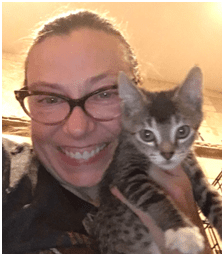
Community (or feral) cats are just like those we know and love in our households, with one important difference. Unlike pets or strays, community cats have not been socialized and tend to avoid humans. These cats go about their daily business just like their ancestors did for thousands of years. Unfortunately, they are really, really good at what they do, and left unchecked, community cat populations can expand and cause problems.
HSLC works to control community cat populations in Loudoun County through its Trap-Neuter-Release (TNR) program. Sharon Nylec has been a volunteer supporting the TNR program since 2004 and talked to us about her experience.
What activities do you support at the Human Society of Loudoun County?
I am active in the TNR program, I am also active in our Loudoun Working Cats program that places community cats with individuals, businesses, or farms that have a rodent problem. And last, but not least, I am a foster. Right now I have a mom cat with five babies, and a teenager kitten.
When did you first get involved and what prompted you to volunteer?
I first got involved with community cats when I started my job as a medical technologist at Inova Loudou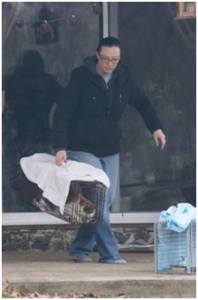 n Hospital in 1998. There were a bunch of resident cats roaming around our back, having litter, after litter, after litter. Every so often the plant operations engineers would load up a box with kittens and ask the hospital employees to adopt them. I adopted one, then another, and finally said this reproduction cycle has GOT to stop. I am at my limit of two cats!!! Of course, that two cat limit is a joke right now!
n Hospital in 1998. There were a bunch of resident cats roaming around our back, having litter, after litter, after litter. Every so often the plant operations engineers would load up a box with kittens and ask the hospital employees to adopt them. I adopted one, then another, and finally said this reproduction cycle has GOT to stop. I am at my limit of two cats!!! Of course, that two cat limit is a joke right now!
Anyway, I started doing some research with the local animal rescue groups and Alley Cat Allies, and found out about their Trap Neuter Return program. They sent someone out to help, and I was fascinated with the process. I asked them to teach me how to do it so I could manage the hospital colony, and the rest is history. We went from 20 cats in 1998 to placing our very last kitty in a home in 2016. There aren’t any more cats at the hospital, so as you can see-TNR takes time, but it works!!
After the hospital cats were trapped I looked for a group more local than Alley Cat Allies that had a TNR program, and the Humane Society of Loudoun County (HSLC) was that group.
What do you most enjoy about your volunteer work?
I love working with people who adore their outdoor cats and want to make their lives better and more comfortable. I also like working with hissy, spitty feral kittens and showing them how great human company can be.
What are the challenges/rewards?
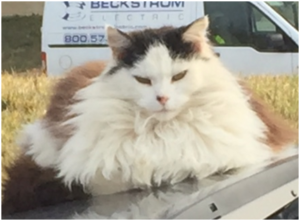 There are so many challenges…working with HSLC is a passion of mine, but I also have a job, my own family, and my pets. Trying to find that perfect balance, trying to make it all fit in takes a lot of effort. I truly wish there were more hours in the day so I could squeeze more work in.
There are so many challenges…working with HSLC is a passion of mine, but I also have a job, my own family, and my pets. Trying to find that perfect balance, trying to make it all fit in takes a lot of effort. I truly wish there were more hours in the day so I could squeeze more work in.
Trapping community cats takes a lot of patience and perseverance, too. We have to work with the cats’ schedule, so a lot of times we are out late at night in sketchy neighborhoods or up really early when we could be sleeping in. If it’s a huge cat colony, it can take up to two years to complete it. Some cats are so smart, they learn what a trap is and avoid it. You have to really think outside the box trap to get them!
You also asked about rewards. Oh my, the euphoria you feel when you finally get that last smartypants mommy cat…it’s a rush! Totally worth all the time and effort I put in, just to get that feeling when the trap door closes on the last cat and you can officially say the site is done!! One colony I did had over 50 cats. It took me over two years and we pulled and placed 25 or more kittens. We are still actively caring for that colony because they are too much for the current property owner to handle, but at least they are done! No more babies!
I must also mention another rewarding aspect regarding a different program with HSLC. The foster program gives you all the “feels.” I feel good rescuing kittens from their hard lives outdoors, and I feel good pulling tame, beautiful cats out of high kill shelters. I’ve had many litters of sick kittens that got better because HSLC sponsored their vet care, and it is a thrill when they are finally healthy and get adopted. Honestly, there is nothing better than knowing you made a difference and you saved a life.
What should people do if they see a feral cat?
First of all, is it truly feral? There is a difference between a domesticated stray and true feral. Strays are usually vocal, and may allow you to approach. A true feral would like you to mind your own business and they will just go on about their day, thank you very much. They are furtive, occasionally defensive, and hardly ever vocalize. Regardless of feral or stray, put out a bowl of food for them the same time every day and fill out our TNR request on line at https://humaneloudoun.org/tnr-application/
We will answer your requests and come to assess the cats. If it is indeed a stray, we try to find the owner. If we can’t find the owner or it is feral, we take them to the vet to be spayed, vaccinated, treated for parasites and microchipped to identify their location. It’s an EXCELLENT program! By the way, we take care of the community cats regardless of the caretaker’s ability to pay, but if someone has the means, we do like to mention they can ‘Spay it forward‘.
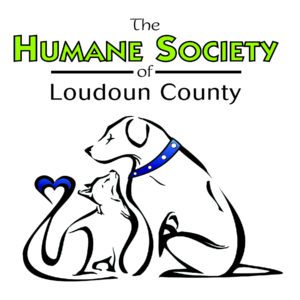
Each Humane Society is an independent organization; “Humane Society” is just a descriptive word — like the word ‘bank’ is in US Bank and Bank of America. They are not connected to each other. It can be confusing!
Many people even mistakenly think that the Humane Society of the United States runs all humane societies. They do not! They do help animals through legislation and in disasters, but do not have a shelter themselves.
Some Humane Societies, like the Humane Society of Loudoun County (HSLC), are “limited admission”. Limited admission organizations sometimes have their animals for many months, and use foster homes. That means they do not have to euthanize animals to make room for new pets they take on. And many, like HSLC, have other programs that help the local animal population, like a pet pantry (Loudoun Pet Pantry) so families in need don’t have to surrender their pets simply because they can’t afford to feed them, partial help when medical emergencies arise, and resources for behavioral issues. The Community cat program is major part of HSLC, helping to reduce the numbers of feral cats while improving their health and quality of life.
And some Humane Societies are “open door” with animal control contracts, just like a city shelter, so they do euthanize to make room. Many “open door” humane societies run programs that have helped reduce pet overpopulation in the cities they serve. They may have the pets for many weeks, and know more about their behavior and health than a city shelter.
So it’s important to understand the nature of your local animal rescues and support them for the benefit of your community. We all work together to help animals but we are separate, independent organizations.
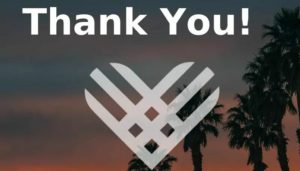
Thank you to all of our Giving Mewsday donors for making Giving Tuesday very successful for HSLC. We met our goal and surpassed last year’s total by a huge amount. Your generosity has given us a great start towards next year’s Kitten Season. A special thank you to Anne Senft and Tom Malloy for your invaluable help.
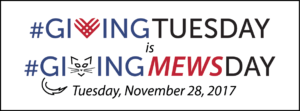
We, and the kittens, says Thank you, Thank you, Thank you.
